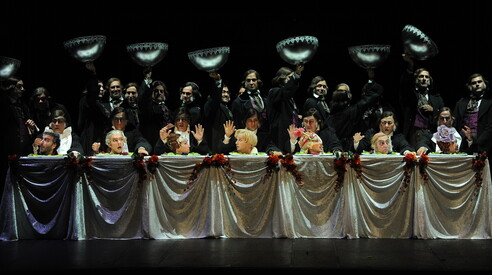Overwhelmed by an unusual Rossini with the Italian in Algiers who is a drag queen


Getty Images
at the theater
A provocative, pop-culture staging transforms the opera into a brilliant satire of kitsch tyrants and glittering rebellions. Drag queens, theatrical gags, and queer symbols spark a surprising and highly topical reinterpretation.
On the same topic:
In the end, it's also healthy theatrical pragmatism. The Rossini Opera Festival asked you to stage L'italiana in Algeri with a 1.80-meter-tall, imposing figure who almost always sang en travesti in Pesaro. So for everyone, she's Tancredi and Calbo and Malcolm and Arsace, not to mention Falliero and Ottone and Sigismondo and Eduardo—in short, the "man" roles so beloved by Gioacigno . And what do you do? You invent a drag queen Isabella, who seduces that hunk Mustafà, here the capricious lord and master of some Middle Eastern democracy. The director is Rosetta Cucchi, the mezzo-soprano Daniela Barcellona, the bass Giorgi Manoshvili, and the trio triumphs in the ROF's new production. The show begins outside the theater, when a van full of glittering drag queens (four of them "real," recruited by Cucchi for sequins and platform costumes) bursts into the crowd queuing to get in. They are promptly arrested by the despot's cops . The rest follows suit, in a super-tacky Algiers where Mustafà displays the opulence and whims of a nouveau riche, Taddeo is the heavy-handed impresario of the Isabella tour, and Lindoro has unwisely signed a restrictive contract as an intern or other slave and thus finds himself toiling in the kitchen. Elvira, Mustafà's desperate housewife, starts out in anti-sex fleece pajamas but, after finally learning how to act like a woman from a transvestite man, ends up in fetish gear with high boots and a whip. The production is a celebration of costume designer Claudia Pernigotti, who pushes kitsch to heights where the lack of taste reveals a very fine one: in any case, Barcelona with an outfit somewhere between Louis XIV and Daniela Santanchè will remain memorable.
Cucchi is very good at portraying a vulgar world without becoming so: the gags work perfectly, and if at times you suspect it's going a bit too far, don't forget that Stendhal's definition of the Italian remains valid forever: "an organized and complete folly"—pick up and take it to Algiers. When the great patriotic rondo arrives, Isabella appears dressed as a man, while images of Stonewall and other sexual liberation hits scroll across the screen. In short, it's all there, even Gioachino Pride, and who knows if some Italian brother or similar burden might take advantage of it to stir up controversy; the Marche region is on an election campaign. In any case, not even a single "poor Rossini!" was heard in the theater: just lots of laughter .
On the musical front, things are less good. Dmitry Korchak is undoubtedly preferable as a tenor than as a conductor, always heavy, limited in dynamics, and with a tendency to lose the stage as it is (he's a singer, one would think, at least he'd accompany well: no way). The tenor who sings, Josh Lovell, struggles with Lindoro's notes. Misha Karia, Taddeo, has a commendable voice, but to be a buffoon, more spice is needed in the phrasing and accent. Instead, the supporting actors are good (especially Haly, Gurgen Baveyan) and, as mentioned, the protagonists are excellent . After Amneris, one expected Barcellona to be in less Rossinian form, but instead she continues to unleash agility with perfect frenzy, and as an actress, she is delightfully self-deprecating: excellent . As for Manoshvili, one has to go back to the days of Ramey to find a bass voice so full, full-bodied, smooth in its agility and rampant in the high notes. His “Pappataci Mustafà!” explodes like a velvet bomb in our grateful ears, and we are happy as we were forty years ago at La Fenice or like those “Rossiniste 1815” (always Stendhal) that we become again every time L'italiana in Algeri overwhelms us.
More on these topics:
ilmanifesto





